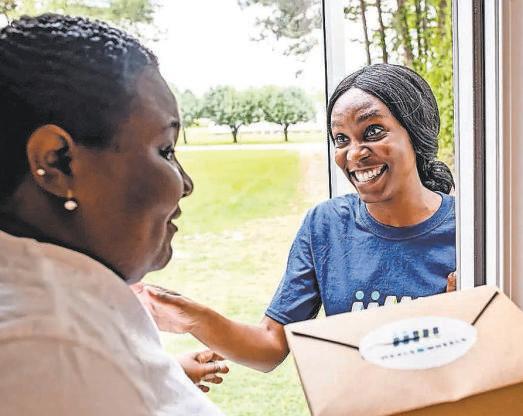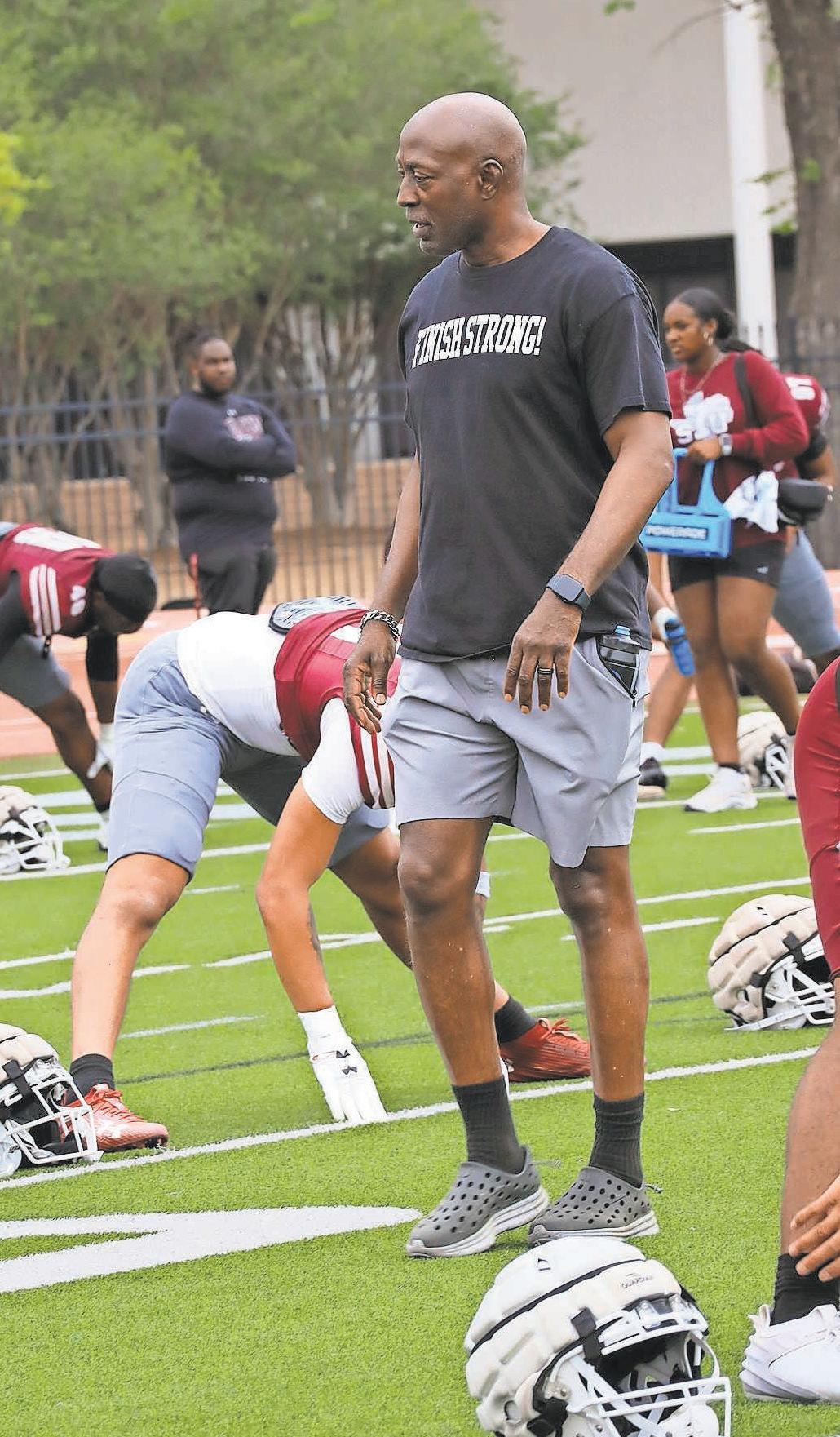


































Restaurant Week was launched
Black Restaurant Week celebrates 10 years
Every year when Black Restaurant Week rolls around, I know one thing is for sure: I’m going to be outside enjoying some great cuisine and my dollars will be put to good use. This is the 10th anniversary of Houston’s Black Restaurant Week. What started with a handful of restaurants has now expanded across the country, creating opportunities for Black-owned eateries to thrive. Given how tough the restaurant industry has been since the pandemic, the affordable marketing and PR support provided by Black Restaurant Week is not just helpful; it’s essential.

I love seeing businesses get the recognition they deserve while serving up everything from soul food classics to Afro-Caribbean fusion. Sure, I could cook at home, but let’s be real—I’m taking full advantage of this celebration. Supporting these restaurants isn’t just about the food; it’s about sustaining Black entrepreneurship and keeping our culture alive through cuisine.
Erykah Badu’s long-awaited return to music
“You better call Tyrone” because Erykah Badu has some great news for her fans. The Texas-born singer hinted at a return to music, teasing her first new album after 15 years. In a music industry that prioritizes virality over longevity, Badu has remained a force. And her collaborations with hip-hop producer The Alchemist on this new album promise something soulful and unexpected, and I’m here for it. And in good old Badu fashion, she will be making a statement. Badu is one of those artists whose music isn’t just sound—it’s a whole experience. From “Baduizm” to
“New Amerykah Part Two,” she’s given us timeless work, and I have no doubt this next album will be the same.
the
The White House Correspondents’ Association canceling comedian Amber Ruffin’s performance is yet another example of the Trump administration’s fragile ego at work. Ruffin, a sharp and hilarious commentator, was deemed too critical of the president—so they axed her. And that was a completely childish move.
The whole point of this dinner has always been to mix journalism and comedy, poking fun at the political chaos of the moment. But this move shows how deeply the Trump administration fears being held accountable—even through satire. It’s a dangerous precedent to set, and it exposes the hypocrisy of an administration that dishes out attacks but can’t take a joke.
Censorship, even in the form of scrapping a comedy act, is a slippery slope. This isn’t just about Ruffin—it’s about suppressing voices that challenge power. And that, more than anything, is truly unfunny.
On the Web
• Rep. Charlene Ward Johnson addresses education, jobs, Black mothers in Texas House.
• OpEd: Black Women, it’s time to wake up to our economic power.
• Carl Crawford’s evolution from MLB star to music executive.
By ReShonda Tate
Signifcant staf reductions at the Department of Health and Human Services (HHS) have led to job losses within programs crucial for seniors, individuals with disabilities, and low-income families. Te layofs, particularly impacting the Administration for Community Living (ACL), have created uncertainty about the future of essential services, including Meals on Wheels.
“We aren’t just reducing bureaucratic sprawl. We are realigning the organization with its core mission and our new priorities in reversing the chronic disease epidemic,” HHS Secretary Robert F. Kennedy, Jr. said in the press release. “Tis Department will do more—a lot more— at a lower cost to the taxpayer.”
Te Trump administration has embarked on a drastic reduction of the federal workforce.
HHS confrmed it had terminated 10,000 staf through a Reduction-in-Force (RIF), with

another 10,000 expected to leave through early retirement or buyout schemes. Te goal is to downsize the agency to 62,000 employees. Former ACL Director Alison Barkof says approximately 40% of the agency’s staf received layof
notices. ACL, which coordinates federal policy on aging and disability, funds programs that support senior centers and distribute 216 million meals annually through Meals on Wheels.
“Tere’s no way to have these RIFs and not impact the programs and the people who rely on them,” Barkof said.
HHS had previously announced that ACL’s responsibilities would be redistributed within the department. However, this follows the Heritage Foundation’s Project 2025 proposal, which suggested ACL take on special education services afer the potential dismantling of the Department of Education. Te current plan for these responsibilities remains unclear. Additionally, the entire staf of the Division of Energy Assistance was laid of, according to former employees Andrew Germain and Vikki Pretlow. Tis division administers the Low-Income Home Energy Assistance Program (LIHEAP), which assists 5.9 million
low-income households with heating and cooling costs and energy efciency improvements.
“Ultimately, I believe the program will crumble from within without the federal ofce there to manage it,’ said former fscal director Andrew Germain. “You’re talking about individuals who rely on crisis assistance... to keep the power on, whether for a medical reason or some other potentially life-threatening purpose.”
Concerns have been raised about LIHEAP’s future, as funding is set to expire in September, coinciding with the onset of winter heating needs. Germain, who oversaw compliance monitoring, expressed uncertainty about the program’s continuation without federal oversight. He also addressed past scrutiny from Project 2025, which had pointed out a now-corrected “loophole” related to SNAP benefts. Congress allocated $4.1 billion to LIHEAP for the 2024 fscal year.
By Tannistha Sinha
HISD Superintendent Mike Miles has proposed a $2.1 billion budget for the 2025-26 school year. During a recent budget meeting, Miles outlined new investments, Legislative Session updates and strategies to “get out of intervention status,” referring to the Texas Education Agency (TEA) takeover of HISD. The calculated trade-offs in the budget, set to be approved in June, require HISD to begin the next school year without jeopardizing its financial footing.
Board goals
The action plan Miles presented is rooted in the board’s goals of:
Improving the quality of education for which no additional funding was allocated
“We will always have some new teachers moving toward certification,” Miles said. “We think we’ll have fewer and fewer of those [uncertified teachers] but we are living in a certified educational deficit in the country and in the state of Texas. So we’ll probably always have an effort to improve teacher instruction.”

Currently, about 16% of HISD’s 13,000 teachers are uncertified and several have no classroom experience.
Miles said the focus will be on principals’ instructional feedback to teachers, improving HISD’s Independent Review Team (IRT) and emergent bilingual instructional strategies.
Implementing a new Teacher Evaluation System (TES) that will receive an additional $1 million the next school year
HISD’s board of managers approved a new teacher evaluation system to implement a pay-for-performance compensation plan.
Principals and appraisers would have to pass a certification to evaluate teachers.
Miles said that while engagement campaigns and professional development would not require extra funding, implementing the TES will require more central office management.
Improving special education instruction, for which no extra funding was allocated
HISD’s allocation of funding for this goal depends on whether more special ed students join the school district and if they do, the budget will increase, per Miles.
Expanding HISD’s Pre-K3 and Pre-K4 programs and adding 800 additional PreK seats with an additional $5 million
Kristen Hole, HISD’s chief academic officer, clarified that the majority of this budget allocation will be for teaching assistants to help reach the school district’s goal of having a 1:11 ratio of students to TAs. The remaining funds will be used for new classrooms, furniture, equipment and curriculum. Hole added that HISD is also investing in marketing resources to inform parents about Pre-K seat availability.
Improving systems and efficiency with an additional $10 million
Miles aims to achieve efficiency through transportation optimization, accuracy of HISD data with a data integration team and tracking KPIs, by decreasing cost and transit time per rider and launching internal dashboards to improve response times.
Taking the example of “chronically absent teachers,” Miles said there are now regulations around teachers who exceed PTO days, which the previous administration did not have.

By Tannistha Sinha
With eight years in the Texas House of Representatives, Rep. Ron Reynolds (D-Missouri City, District 27) expects more opposition than ever from his Republican colleagues in passing legislation during the 89th legislative session.
He has filed 109 bills that confront Make America Great Again (MAGA) policies on school vouchers, DEI ban, health care and environmental justice that Reynolds believes disproportionately impact Black Texans.
Passing his legislation is challenging, which he attributes to Republicans’ fear of a far-right MAGA base that votes in Republican primaries. Although he has learned to “work relationships” and discuss bills from a “fiscal impact” perspective, Reynolds has noticed increased polarization.
According to Reynolds, the 2026 midterms will see a power shift in the House with a Democrat majority, when people are “sick and tired of these bad policies and vote out these MAGA extremists.”
Reynolds filed several bills during the 89th legislative session that pertain to public education, including HB 3295, which seeks to offset the impact of the bill banning DEI (SB 17). He said since Texas universities implemented the anti-DEI policies, African American and minority students and faculty members have decreased, although the state has the largest Black population (nearly 4.3 million).
“I wanted to offer a solution of how we fix it, even though I know realistically the likelihood of me being able to pass it is probably 0.1%,” he said.
Reynolds added that he also strongly opposes HB 3, which will establish an education savings account program (vouchers) to use public funds to help pay for private schools. He pointed out that many families relying on aid will likely lose it, and that voucher programs will divert funding from public schools, disproportionately harming Black and Hispanic school districts that are already underfunded.
Through HB 726 and HJR 61, Reynolds proposed Medicaid expansion under the Affordable Care Act, foreseeing difficulty in passing them. He said these bills are to ensure low-income people get treatment that otherwise costs “tens of thousands of dollars out of pocket.”
“When people don’t have access to healthcare, they don’t get that early detection more times than not,” he said. “It’s cruel to me that in this state, we continue to have partisan politics instead of prioritizing human health and dignity for people that can get healthcare regardless of their income levels.”
Several of Reynolds’ bills (HB 838, HB 853, HB 866, HB 3298) address environmental regulations and energy reform. He criticized the proliferation of concrete batch

plants and other environmental hazards in Houston’s Black and Brown communities, stating that affluent, predominantly white areas are not targeted for such developments.
“These neighborhoods [Black and Brown] don’t have the ability to fight back. They don’t have the lobbyists,” he said.
He highlighted environmental justice issues, including higher rates of asthma and cancer clusters, especially near schools. Reynolds has filed legislation to prevent the Texas Commission on Environmental Quality (TCEQ) from granting permits for unsafe plants in marginalized areas. Committed to fighting for policies that benefit working-class Texans, Reynolds said he will continue advocating for his constituents and Texans.
“On our watch, we must be the resistance. We must be the agitators,” he said. “We’re not going to back down and let them walk over us and take us back to dark days. We made tremendous progress in this country because of those people who took a stand…But if we’re not careful, many of those rights that we won will be lost.”

By Tannistha Sinha
“Neglect” is the word used to describe neighborhoods like Sunnyside, Northwood Manor, and Kashmere Gardens, based on comments from Houston civic club leaders of Black and brown neighborhoods.
Community leaders from underserved communities say they expect elected officials to consider the residents’ concerns shared during these meetings when making decisions about a district, whether allocating funds or providing resources for the underserved. However, these community leaders say there remains a gap in addressing their issues and in the communication between local organizations and city officials.
These neighborhoods also grapple with issues like gentrification and poverty.
“We’re being left behind,” Frederick Woods, president of Northwood Manor Civic Club. “This is what neglect looks like when you fail to plan for your most vulnerable residents, most impoverished residents ahead of time and communicate with them before a disaster happens…when the sun is out, and the skies are clear, and then a disaster happens, then it’s just chaos.”
Houston’s civic clubs have operated for generations, solving local issues through members’ volunteer work. These include community engagement, cleanups, beautification, collaboration with school districts, and developmental projects. These neighborhood-based organizations hold monthly meetings where residents voice their concerns among those they have known for years.
According to a study by Rice University’s Kinder Institute, four historically Black communities are facing gentrification: Fifth Ward, Third Ward, Independence Heights, and Sunnyside. The 77051 ZIP code in the Sunnyside neighborhood has the lowest median income with a 79.4% Black population.
“This is what neglect looks like…”
Woods has been a long-time resident of Northeast Houston. He is the fourth generation inhabiting the house his great-uncle owned.
As a community leader, he believes this area has been neglected for several years.

Woods listed the lack of meeting places, gyms, quality grocery stores, and coffee shops as a few of the area’s residents’ needs. He also highlighted the issues of abandoned homes falling to blight and illegal activities. He said illegal dumping is also common in his neighborhood.
Today, Woods advocates for generators and supplemental warming and cooling centers for the northeast’s “historically neglected” communities. He added that centers like the Judson Robinson, Jr. Community Center, Northeast Multi-Service Center, Acres
Homes, and areas in District B with Black majority neighborhoods have a “history of neglect.”
“They’re stuck in a pattern of relief and rescue,” Woods said.
“This is Houston too…”
Keith Downey, the founder of the Northeast Houston Redevelopment Council and the president of Kashmere Gardens Super Neighborhood Council #52, said elected officials “don’t necessarily have to be right in what they’re saying to people,” but “a
community leader can never be wrong.”
Downey referred to the trust residents place in a community leader when addressing concerns. He suggests that city council members work alongside community members to cater to residents’ needs. He said residents have different needs, ranging from space heaters to reliable public transportation and quality groceries.
“No matter the administration in this country, federal, state, or local, whenever it comes to these communities, they never had the funding. They can’t ‘afford it,’” he said.
Downey reminded the city’s leaders that during Hurricane Beryl, the Kashmere Gardens multi-service center also lost power. The center was designed to address inequities and provide power and food, among other resources.
“A hurricane comes today or tomorrow, what’s the plan, and how has it been shared with communities and their leaders to know?” Downey asked. “Unfortunately, we are still trying to bounce back from storms that happened decades and decades ago... This is Houston too, and these are taxpayers as well.”

By ReShonda Tate
Tina Knowles, renowned businesswoman, fashion designer, and mother to musical powerhouses Beyoncé and Solange, is set to release her memoir, Matriarch , on April 22, 2025. The memoir offers an intimate look into her journey from a spirited young girl in Galveston, Texas, to becoming a cultural icon and matriarch of a globally influential family.

“I have always been a storyteller, and it’s something I learned from my mother. When I had a family of my own, I beleived that my daughters needed to know where they came from in order to know where they were going. I’m not ready to share my story so that we can all celeberate these themes of strength, motherhood, Black pride and identity,” Knowles wrote on Instagram.
In Matriarch, Knowles delves into her upbringing as the youngest of seven siblings, her experiences navigating racial challenges, and her aspirations beyond her childhood surroundings. The narrative chronicles her entrepreneurial ventures, including the establishment of her groundbreaking Houston hair salon, Headliners, in 1986, and her pivotal role in guiding Destiny’s Child to international stardom. Additionally, she discusses co-founding the House of Deréon and her involvement with Cécred, Beyoncé’s

Tina Knowles will be in Houston on May. 5. Credit: Getty Images
haircare line.
“I am calling this book Matriarch because what inspires me is the wisdom that women pass on to each other, generation to generation. Even at 70 I am still learning valuable lessons - revelations that I wish that I would have had at 40 or even 20,” she said.
Houston readers will have the opportunity to engage with Knowles during her nine-city book tour, which includes a stop at the Smart Financial Centre in Sugar Land on Monday, May 5 (Kelly Rowland will host). These events promise enriching conversations, with Knowles sharing insights from her memoir alongside special guests. Notably, former First Lady Michelle Obama is slated to join her in Washington, D.C., on April 30.
More information is available at TinaKnowlesBook.com.
The Metropolitan Transit Authority of Harris County, Texas (METRO) is planning to issue the procurement documents listed in this advertisement.
RFP No. Doc1504579830: METROLift Eligibility Services. Solicitation will be available on or about 0325-2025. Prospective bidders/proposers can view and download these solicitations by visiting METRO's website at ridemetro.org/Open Procurements. If you are unable to download the documents or are having difculty, please contact 713-739-6886 or email Contracts/Property Services at propertyservices@ ridemetro.org.
The Harris Center for Mental Health and IDD will be accepting proposals for the following: Pest, Termite and Bed Bug Services
Specifcations may be secured from The Harris Center website www.theharriscenter.org beginning Tuesday, April 8, 2025. The Harris Center utilizes Bonfre for their solicitations https://theharriscenter. bonfrehub.com/portal/?tab=openOpportunities . A Mandatory site visit with vendors will be held at 2627 Caroline St., Houston, Texas, 77004 on Monday, April 14, 2025, at 9:00 AM. Deadline for prospective vendors to submit questions to this RFP is Friday, April 18, 2025. Proposals must be submitted by 11:00 a.m., Monday, May 5, 2025. Historically Underutilized Businesses, including Minority-Owned Businesses and Women-Owned Businesses are encouraged to participate. The Harris Center reserves all rights to reject any and/or all proposals, to waive formalities and reasonable irregularities in submitted documents as it deems to be in its best interests and is not obligated to accept the lowest proposal.
By Aswad Walker
Who says old dogs can’t learn new tricks? Houston’s historic Wesley AME, just two years shy of 150 years old, is enjoying a “season of transformation” in the form of new pastors and a new location.
John White II and his wife, Maria Mallory White, are pastor and co-pastor, respectively, of the iconic congregation that for decades resided on Emancipation Ave.
Soon, Wesley will be a seriously southwest Houston congregation located at 12850 Cityscape Ave., Houston 77047, right of Highway 288 between W. Orem and Almeda Genoa.
Te congregation is currently still holding its services at Brentwood Baptist Church since selling its Tird Ward property to the City of Houston for the building of a gospel music museum. But the pastors hope to open the doors to their new sanctuary in mid-April.
Te Whites made an even bigger location move, arriving in Houston from Florida.
John, a fifth-generation Floridian, met Maria, Ohio-born and Maryland-raised, at a funeral in Atlanta. Te pair, both preachers’ kids, built a life that included Maria’s award-winning journalism career and then transition into ministry with her husband. Tey’ve pastored multiple Florida churches. But they’re enjoying their new hometown.
“Man, it’s a Pappadeaux’s on every corner,” answered John when asked what he likes most about Houston. “I’ve gained weight… because I keep going to Pappadeaux’s. It keeps calling my name; the gumbo.”
Maria loves Houston for a diferent reason.
“Houston is my newest and favorite example of a Chocolate City,” she said, referencing an old Parliament/Funkadelic song. “I like that brothers and sisters are thriving in Houston.”

Maria also appreciates Houston’s diversity, which goes beyond merely Black and white. But she especially appreciates what Houston ofers the White’s two teenage sons (13 and 17).
“Houston is a good place for them to be as young Black men. I think I read somewhere Houston has the largest number of professional and college-educated Black men west of the Mississippi. Tat’s a blessing for our children to see that.”
But the Whites aren’t merely appreciative of blessings received, they seek to be a blessing to their congregation and the Houston area.
John says “holistic” best describes their ministry focus.
We don’t wanna just help folks get to heaven, we wanna help them live in the kingdom of God here on earth, particularly in light of all the things that’s going on in our divided states of America right now.”
PASTOR JOHN WHITE II
“We don’t wanna just help folks get to heaven, we wanna help them live in the kingdom of God here on earth, particularly in light of all the things that’s going on in our divided states of America right now.”
Maria added, “[Kingdom living] is a huge focus of our ministry because we don’t want our lives to be separate, what you
do on your job, what you do in your club, what you do in your sorority and fraternity, oh, and then on Sundays, ‘I’m gonna go to church.’ We want people to know that the word can be alive and the power of the word that is promised in Christ Jesus is real and can be real in our lives.”
And they’re getting that message across to the Wesley AME faithful, including longtime member Carl Davis.
“Rev. John F. White II and co-pastor Rev. Maria Mallory White bring a unique twist to Wesley AME Church’s rich legacy that will only empower us as a congregation spiritually,” said Davis, who is also a member of the AME Church’s national General Board. “Teir leadership will put us on the road to strengthen our faith and give service to the community.”
And Davis is not alone in his praise of Wesley’s new dynamic pastor duo.
“Our new pastors are taking us in a new direction,” said 102-year-old Wesley usher Juanita Williams. “Tey have a heart to help people by providing food, clothing, computers and more, to meet the needs of the community.”
Maria sees the biggest ministry challenge as moving people beyond citing scriptures, creeds, and “church-speak,” and into an expansive experience.
“Saying. ‘I believe Jesus is a son of God and was raised from the dead,’ that’s beautiful, but that is limiting what God wants for us. I think the biggest challenge is to help people understand that religion is a relationship. Christianity is a relationship with the person of Christ through the Holy Spirit, and it’s dynamic.”

John envisions that dynamism playing out in words shared by one of his favorite authors, Washington pastor Mark Batterson – doing ministry out of imagination and not just out of memory.
“So, how do we do ministry out of imagination? Our ancestors did ministry out of imagination. People with no education starting schools. People with no business savvy started benevolence societies,” said John, who seeks to facilitate that kind of ministry derived out of imagination and not just ministry out of memory.
Focuses on discipline, a mantra for spring football
By Terrance Harris
It was the second day of spring football practice, and second-year Texas Southern football coach Cris Dishman could be heard from the stands at Durley Stadium expressing his frustration with his players who didn’t follow the specifc dress code of wearing black socks.
It might seem like a small thing on Day 2 of spring ball. But for Dishman, it’s about discipline, a major mantra during his second spring practice with the Tigers.
“We want guys who are going to be in the right place at the right time, guys who are going to listen to the coach. We can teach you everything else,” Dishman said to the Defender. “We want guys who don’t want to do their own thing. If we say black socks, they have black socks on. If we say buckle your helmets, their helmets are buckled.
“I’m looking for disciplined guys, guys with high football IQs, guys who are going to do what the coaches say.”
It’s the second go-around for the Tigers with Dishman and the more lenient Dish is gone.
Don’t get it wrong, Dishman is still about
Our players know how we coach. They know we are hardass. We are going to be on them. They also know we love them and that we are going to be with them and we want them to be great men frst and foremost.”
instilling values, promoting education and making his players know he cares about their total selves. But he is all about making sure they are on point in his second year of spring ball.
“Our players know how we coach, they know we are hardass, we are going to be on them,” said Dishman, whose team went 5-6 overall, 4-4 in the SWAC and eight points away from fnishing with the program’s frst winning record in decades. “Tey also know we love them and that we are going to be with them and we want them to be great men frst and foremost.
“Te diference, they understand the way we coach.”
Players have heard and adhered to the expectations and messages. Defensive tackle Syncere Massey played for the Tigers last season but he was still at Abilene Christian last spring. He heard what Dishman was like last spring and it’s nothing like the Dishman he is experiencing now.
“Last year, I heard they were a little more lenient because it was a new staf,” Massey said. “But now I can say, Coach Dishman is not lenient anymore. If you are getting into trouble, you are of the team. He is not wanting to give you more chances. Tis is a team and you have to sacrifce and he is more on it.
“He is not sof. He’s like, `We already went through this afer that frst year together. Y’all know how I am so if you don’t want to be here, we are going to weed the ones out who don’t want to be here.’”
Defensive tackle Demarcus Tompson has the beneft of going through a second spring practice with Dishman and his staf so it hasn’t been quite the shock to his system that it might be for others.
“I would say it’s more comfortable for me with the coaches because I’m already familiar with the scheme and tempo,” Tompson said. “I would say for other guys coming in, it’s always going to be a little bit tough, but I feel like once they get here and go through spring, go through the summer and go through the little fall camp we will all get it together.”
Te Tigers have 20 newcomers on the spring roster, comprised of transfer portal players and graduate transfers. Te Tigers also lost a few players to the portal like tight end Jyrin Johnson, who landed at Bowling Green, defensive end Keelan Cox, who is


now playing for Sam Houston State, and defensive lineman Stephon Wright, who found a spot with UConn.
But right now, most eyes are on the quarterback position, where last year’s season-opening starter, KJ Cooper, is back afer missing all but the season opener due to injury. Jordon Davis, a product of Fort Bend Marshall, played in fve games last season as a redshirt freshman. Cooper and Davis are competing this spring afer Jace Wilson, who started much of last season, graduated and is presumed to be looking to spend his last year of eligibility elsewhere.
“It’s hard to win games without a quarterback,” Dishman said.
On this particular day at practice, both quarterbacks had a great day with Cooper
and Davis both completing long passes for multiple touchdowns. But if one is ahead of the other, Dishman isn’t likely to say until the Aug. 30 Labor Day Classic against rival Prairie View.
“It’s still early, so I’m not going to say who is starting or not starting. We don’t have starters,” he said. “Everybody is trying to get better.”
For the players, it’s just exciting to see two quarterbacks out there competing.
“I feel like we are building a lot, we’ve just got our quarterback back so I feel like we can pick it up on ofense because last year we kind of slacked, and the defense kind of picked it up,” Tompson said. “But overall, I feel like we’ve got a lot of new guys who can come in and help us out.”
By Jimmie Aggison
Franchelle Hill’s journey from standout track athlete to coach has come full circle, and she’s now back at her alma mater Hightower High School, where she is making a significant impact on the girls’ track program.
“Coach Hill is motivating, supportive and a mentor both on and off the track,” said Hightower 100-meter sprinter Jocelyn Higgins. “She never lets me hold my head down for too long and always has the best advice in moments when I felt that I didn’t do my best. I’m grateful for her and wish we could have crossed paths sooner.”
A former star athlete herself, Hill’s return to Hightower has been marked by inspiring success, hard work and a deep connection to the legacy that shaped her athletic career.
As a high school sprinter, Hill made a name for herself in various events, including the 100-meter dash, 200-meter dash, 4x100-meter relay, 4x200-meter relay and 4x400-meter relay. But it was her performance in the 100-meter dash that really stood out.
In the 100-meters, Hill ran 11.59 seconds, setting the Hightower High School record, which still stands to this day.
After competing in college at Texas State University, Hill began coaching track at Summer Creek and later Stafford High School. However, when the COVID-19 Pandemic hit in 2020, Hill decided to take a break from coaching. But as the pandemic subsided and a position opened up at Hightower High School, Hill knew it was time to return home.
“With the influence of my high school coach David Pollack, my collegiate coach Dana Boone and my father and youth coach Frankie Hill, I’ve always felt a calling to give back to the same program that helped me become the athlete and person I am today, said Hill.”

Now back at Hightower, Hill is bringing her passion, knowledge and experience to the next generation of track athletes. She is committed to not only coaching but also inspiring and mentoring her athletes, especially the girls in the program.
“It’s incredibly meaningful to see these girls achieving success,” said Hill. “As a Hightower graduate, I feel so proud to give back to this program and help these athletes create their own legacy. Their growth and accomplishments make me proud—not just as a coach, but as someone who once walked in their shoes.”
accomplishments, she remains focused on improving the team’s handoffs and overall technique.
“Even with that achievement, our handoffs still need a lot of work,” Hill acknowledged. “There’s plenty of room to drop time, and we’re focused on improving our exchanges and getting stronger as the season progresses.”
I’ve always felt a calling to give back to the same program that helped me become the athlete and person I am today.”
HILL
COACH
Recently, at the 73rd Annual Texas Southern Relays, the Hightower girls’ 4x100-meter relay and 4x200-meter relay teams both captured first place, a major accomplishment for Hill and the program.
The girls’ 4x100-meter relay team clocked an impressive 48.14 seconds at the relays, though their season-best time remains 46.96 seconds. Meanwhile, the 4x200-meter relay team set a new personal record with a time of 1:42.48. While Hill is proud of these
The 4x100-meter relay team includes Jocelyn Higgins (Senior), Lauryn Mayon (Junior), Oprah Dimson (Sophomore), and Germani Carhee (Sophomore). The 4x200-meter relay team features the same runners, with Destinie Woodall (Senior) replacing Carhee.
Hill has high praise for all of her athletes, acknowledging their unique contributions to the team’s success.
“Jocelyn Higgins is our steady hand,” Hill said. “Her consistency and technical precision make her a reliable competitor, and she executes her races with discipline. Lauryn Mayon is one of our most dependable runners, always giving 100%. She has
the endurance and smooth transitions that make her invaluable in relays. Oprah Dimson’s raw talent and fearlessness are a big asset, and she’s becoming a major force in our team. Germani Carhee is still young, but she already has the maturity and grit of an elite athlete. Destinie Woodall is a powerhouse with her explosive speed and competitive spirit. She pushes herself and her teammates to higher levels every race.”
One of the greatest challenges Coach Hill has faced since returning to Hightower is helping the track program reinvent itself. Hightower has a rich history of competitiveness, and Hill is dedicated to bringing that mindset back to the forefront.
“Rebuilding a championship mindset takes time,” said Hill. “It requires getting the athletes to believe in both themselves and the process. Establishing a culture of discipline, accountability, and trust while pushing them to meet the high standards this program is known for has been a challenge—but also an incredibly rewarding experience.”
By Laura Onyeneho
Dr. Melanie Wilson-Lawson had to pump the breaks on her life’s stressors for her health before embracing her version of a “sofer lifestyle.”
A stage-three breast cancer survivor, she recalls how her diagnosis forced her to reevaluate her life, set boundaries and prioritize her well-being.
“I had to do a deep dive into how this happened. Stress, overwork and self-sacrifce were all factors that contributed to my breakdown,” she says. “Now, I tell women—you don’t have to experience a breakdown to start living in alignment with your needs. Prioritize yourself now.”
Wilson-Lawson’s story is not unique. For generations, Black women have been praised for their resilience, ability to push through hardship and unwavering strength. But at what cost?
Increasingly, Black women are rejecting the relentless hustle culture and embracing a new way of life—one that prioritizes self-care, rest, and overall well-being. Tis movement, coined the “sof life,” is more than a feeting social media trend. It is a radical shif in how Black women define success, health, and happiness.
by stress-related illnesses, including hypertension, anxiety and depression. Te cultural expectation to “push through” ofen prevents them from seeking the care they need.
Wilson-Lawson emphasizes how these societal pressures manifest in everyday life.
“For so long, Black women have been told that rest is a luxury, that prioritizing themselves is selfsh,” she said. “But we are seeing a shif—women are reclaiming their right to rest as an essential part of their health. Rest is not weakness; it is resistance.”
She also says that the sof life movement actively challenges traditional narratives about Black womanhood.


Dr. Tondra L. Moore, Executive Director of Student Health Services at Prairie View A&M University (PVAMU), has observed firsthand the toll that the “strong Black woman” stereotype takes on young Black women. “With young professionals, I see them struggle with work-life balance, believing they must do everything perfectly,” she says. “For students, many feel they carry their families on their backs, setting ambitious goals while neglecting their well-being. We have to help them reframe their aspirations in a more sustainable way.”
Te expectation of constant resilience has serious consequences. Research shows that Black women are disproportionately afected
“This movement forces us to deconstruct norms that have been imposed upon us for generations. Black women have been conditioned to endure and weather every storm, but now we are choosing to move diferently,” said Wilson-Lawson. We are more intentional about protecting our peace and embracing a new way of living.”
The trend of Black women living a sof life on social media has a long history in pop culture. Television shows like Girlfriends and Te Fresh Prince of Bel-Air featured “bougie” women prioritizing their needs, enjoying luxury and being unapologetic about it. This was not encouraged in the 90s when misogynistic stereotypes dominated, and representation of Black women in wealth positions was limited.
Now, this new generation is picking up where the women of previous generations lef it and is transforming this movement in its way.
The deeper meaning of soft life
Tumi Adeyoju, a Houston-based lifestyle

A soft life is a lifestyle of comfort and relaxation with minimal challenges and stress. Credit: DragonImages/Getty Images
content creator, has built her platform around self-love, wellness and the sof life movement.
“For me, embracing the sof life means not taking life too seriously. It’s about slowing down, being present and prioritizing my selfcare and mental health,” she says. Adeyoju frst began sharing her journey through blogging in 2020, and as her audience grew, she expanded into video content that resonated deeply with young Black women seeking balance in their lives.
“Journaling has been a key practice for me,” Adeyoju says. “It helps me regulate my emotions, set boundaries and check in with myself. Whether taking a day each week just for me, engaging in my skincare routine, or simply refecting on how I feel, I create space for my well-being.
While social media has signifcantly popularized the “sof life” movement, critics argue that it ofen presents an overly materialistic view—luxury vacations, designer bags and spa days. However, Black women embracing the sof life emphasize that it is about much more than aesthetics.
Adeyoju has encountered criticism for embracing rest and ease over hustle culture.
“Some people see the sof life as laziness,” she explains. “But I tie it back to mental health. Hustle culture has led to rising rates of anxiety, depression, and even heart disease among Black women. We need to prioritize longevity and well-being over constant work.”
Wilson-Lawson also dispels the notion that the sof life is reserved for the fnancially privileged.
“Slowing down, prioritizing mental health and setting boundaries does not require wealth. Te key aspects of the sof life—intentionality and mindfulness—are accessible to everyone. It’s about making a conscious efort to live in a way that protects your well-being, regardless of your socioeconomic status.”
As more Black women embrace the sof life, the challenge remains to make it sustainable beyond social media trends.
“It’s not just about treating yourself occasionally; it’s about fundamentally shifing how you approach your life,” Dr. Wilson-Lawson explains. “Tat means advocating for mental health resources, normalizing therapy and creating environments—both at home and in the workplace—that support Black women’s well-being.”